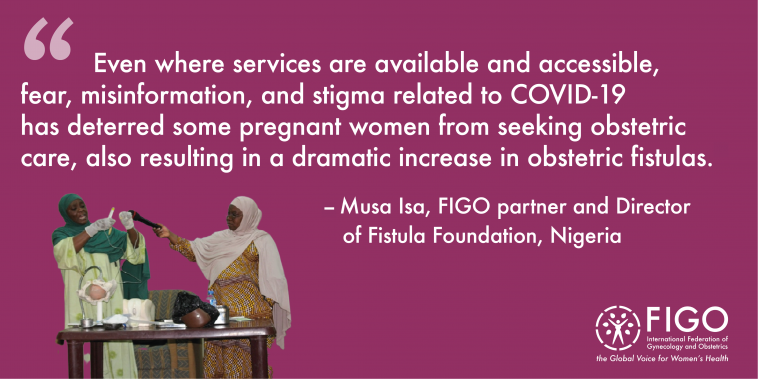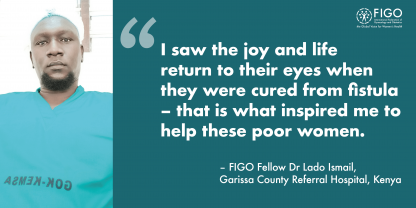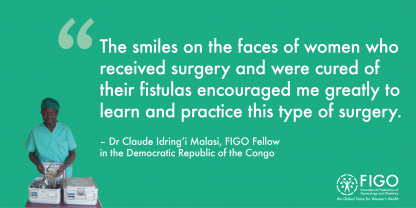Stories from FIGO's Fistula Surgery Partners – Nigeria

Obstetric fistula is a neglected public health and human rights issue, and a devastating childbirth injury. It leaves women permanently incontinent, and it is currently estimated that only 1 woman in 50 is able to access corrective treatment.
The FIGO Fistula Surgery Training Initiative is a globally recognised, pioneering programme offering training and education in fistula surgery. Our 67 trainee surgeons – ‘FIGO Fellows’ – provide life-transforming care in some of the world’s most underserved regions, thereby helping to close the fistula treatment gap.
This month, we spoke to FIGO partner Musa Isa, Director of Fistula Foundation Nigeria about his experience of caring for women with fistula and his important work supporting FIGO Fellows in his country.
"Since 1984, I have worked with women with obstetric fistula. I decided to create an avenue that complements the existing medical and surgical work being done in Northern Nigeria by Professor Kees Waaldijk and his team in various hospitals, by providing women with the necessary support required so they can take steps to return to their communities.
"Uniquely, our foundation specifically targets and helps women who have suffered significant marginalisation and social exclusion, and those that have incurable injuries. We have built up specialist expertise in reintegrating these women back into their communities.
"We do continuous daily counselling for women with fistula who are in difficult social situations or suffering from psychiatric conditions. We also provide social support and capacity building activities, particularly in entrepreneurial skills, to those who feel they cannot return home because they have been rejected for a long time. We then do extensive community outreach, including tracing of relatives, escorting women back home and facilitating reunification. In most cases, these women are successfully reintegrated with their communities, but in some cases, especially where the surgical repair was not completely effective, we help women to develop new community systems.
"The scope of our reintegration activities also extends to community mobilisation and behaviour change communication activities to prevent further fistula cases from developing. Central to these activities is the training of women who have had an obstetric fistula to become community educators. To date, 520 women have been taught communication techniques so that they may educate the community on the causes of obstetric fistula, to reduce stigmatisation and mobilise the community, especially the men and community leaders, to seek surgical care and reintegration for women with fistula."
Impact of the COVID-19 pandemic
"In Nigeria, due to COVID-19, fistula treatments have been categorised as non-essential and service provision has been suspended, which has caused a dramatic increase in the number of women with an untreated obstetric fistula. Even where services are available and accessible, fear, misinformation, and stigma related to COVID-19 has deterred some pregnant women from seeking obstetric care, also resulting in a dramatic increase in obstetric fistulas.
"Following the easing of COVID-19 movement restrictions, we have re-commenced efforts to reduce the prevalence of untreated fistula by enhancing access to treatment for marginalised women and girls suffering with obstetric fistula, whilst taking measures to protect the health of all fistula patients and medical personnel by providing personal protective equipment."
Working with FIGO Fellows in Nigeria
"Fistula Foundation Nigeria has been working with FIGO Fellow surgeons, including Dr Lamaran Dattijo in Ningi, Professor Mairo Hassan in Sokoto and Dr Sadiya Nasir in Katsina. We work with them to bring women with fistula to free treatment sites and to train health workers on fistula prevention and basic level management (using the FIGO manual). FIGO Fellows are doing excellent work in the treatment and management of obstetric fistula, despite the challenges brought about by COVID-19."

FIGO Fellows, Prof. Mairo Hassan (left) and Dr. Sadiya Nasir demonstrating how to insert a bladder catheter during orientation of 150 health workers in Sokoto State

FIGO Fellow, Dr. Dattijo Lamaran demonstrating how to insert a bladder catheter during orientation of 150 health workers in Bauchi State
Halima’s story
"My name is Halima, I am 20 years old. My parents were killed by Boko Haram insurgents. The sect stormed our community to kidnap young people, perhaps for conscription. I was among the number of women and girls who were abducted by Boko Haram to Sambisa forest. I was forced to “marry” the same man who killed my family, and I became pregnant .
I was eight months pregnant when I finally escaped, slipping into the bush while my captors left for destruction as usual. It wasn’t easy to run through Sambisa forest at night.
I was rescued by soldiers in the bush and rushed to a primary health care facility where I was admitted.
Unfortunately, the community was attacked by Boko Haram a few hours after my admission. All the health workers who were trying to save my life fled. I waited several more hours before I was rescued for the second time. I was so weak and bleeding and was rushed to the hospital where my life was saved. The child was stillborn and I got a fistula. I was discharged to an internally displaced persons camp after four weeks and was lucky to meet my older and only sister alive in the camp.
I find it difficult to live in harmony with other people in the camp as it annoys me a lot that people here in the camp view me as a Boko Haram abductee or “Boko Haram’s wife”. I try to isolate myself from people.
My doctor explained to me that I sustained a very complex and extensive fistula and thus my surgery is going to be in stages. My fistula was finally diagnosed as inoperable after my second attempt of surgery
Though I am still leaking, my wish in the future is to be educated, specifically in either medicine or law, I need to educate other women, we need to know our rights and also fight for them.
Thanks to my surgeons for the first and second stage of my free surgery. Thanks to Baba Musa for his continuous counselling and words of encouragements. I can now smile again."
23 May marks the annual International Day to End Obstetric Fistula.
Help FIGO to end obstetric fistula by donating to the FIGO Fistula Surgery Initiative, as well as spreading the message on social media using our toolkit.


